
Leon Max Lederman was an American experimental physicist who received the Nobel Prize in Physics in 1988, along with Melvin Schwartz and Jack Steinberger, for research on neutrinos. He also received the Wolf Prize in Physics in 1982, along with Martin Lewis Perl, for research on quarks and leptons. Lederman was director emeritus of Fermi National Accelerator Laboratory (Fermilab) in Batavia, Illinois. He founded the Illinois Mathematics and Science Academy, in Aurora, Illinois in 1986, where he was Resident Scholar Emeritus from 2012 until his death in 2018.
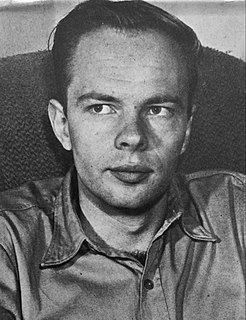
Philip Kindred Dick was an American science fiction writer. He wrote 44 novels and about 121 short stories, most of which appeared in science fiction magazines during his lifetime. His fiction explored varied philosophical and social questions such as the nature of reality, perception, human nature, and identity, and commonly featured characters struggling against elements such as alternate realities, illusory environments, monopolistic corporations, drug abuse, authoritarian governments, and altered states of consciousness.
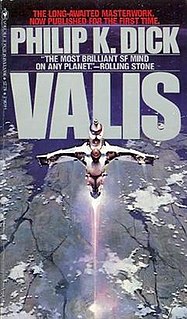
Valis is a 1981 science fiction novel by American writer Philip K. Dick, it is one book of a three part series. The title is an acronym for Vast Active Living Intelligence System, Dick's gnostic vision of God. Set in California during the 1970s, the book features heavy auto-biographical elements and draws inspiration from Dick's own investigations into his unexplained religious experiences over the previous decade.
The Japanese and Korean term mu or Chinese wu, meaning "not have; without", is a key word in Buddhism, especially Zen traditions.
Nothing comes from nothing is a philosophical dictum first argued by Parmenides. It is associated with ancient Greek cosmology, such as is presented not just in the works of Homer and Hesiod, but also in virtually every internal system: there is no break in-between a world that did not exist and one that did, since it could not be created ex nihilo in the first place.
Ralph Nelson Elliott was an American accountant and author, whose study of stock market data led him to develop the Wave Principle, a description of the cyclical nature of trader psychology and a form of technical analysis. It identifies trends and reversals in financial markets. These cyclical patterns in price movements are known among practitioners of the method as Elliott waves.
Edward P. Tryon was an American scientist and a professor emeritus of physics at Hunter College of the City University of New York (CUNY). He was the first physicist to propose that our universe originated as a quantum fluctuation of the vacuum.

Who Wants to Be a Millionaire? is a British television quiz show, created by David Briggs for ITV. The programme's format sees contestants taking on multiple-choice questions based upon general knowledge, winning a cash prize for each question they answer correctly, with the amount offered increasing as they take on more difficult questions. If an incorrect answer is given, the contestant will leave with whatever cash prize is guaranteed by the last safety net they have passed, unless they opt to walk away before answering the next question with the money the cash prize they had managed to reach. To assist in the quiz, contestants are given a series of "lifelines" to help answer questions.

"The Bellero Shield" is an episode of the original The Outer Limits television show. It first aired on 10 February 1964, during the first season.

Dr. Mani Lal Bhaumik is an Indian American physicist and a bestselling author.

John Horgan is an American science journalist best known for his 1996 book The End of Science. He has written for many publications, including National Geographic, Scientific American, The New York Times, Time, Newsweek, and IEEE Spectrum. His awards include two Science Journalism Awards from the American Association for the Advancement of Science and the National Association of Science Writers Science-in-Society Award. His articles have been included in the 2005, 2006 and 2007 editions of The Best American Science and Nature Writing. Since 2010 he has written the "Cross-check" blog for ScientificAmerican.com.

Programming the Universe: A Quantum Computer Scientist Takes On the Cosmos is a 2006 popular science book by Seth Lloyd, professor of mechanical engineering at the Massachusetts Institute of Technology. The book proposes that the Universe is a quantum computer (supercomputer), and advances in the understanding of physics may come from viewing entropy as a phenomenon of information, rather than simply thermodynamics. Lloyd also postulates that the Universe can be fully simulated using a quantum computer; however, in the absence of a theory of quantum gravity, such a simulation is not yet possible. "Particles not only collide, they compute."
Judith Hooper is an American journalist.
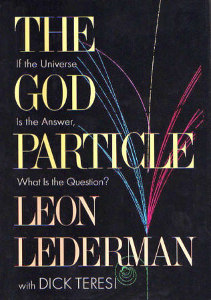
The God Particle: If the Universe Is the Answer, What Is the Question? is a 1993 popular science book by Nobel Prize-winning physicist Leon M. Lederman and science writer Dick Teresi.
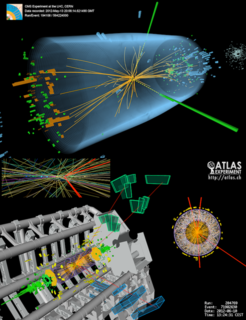
The Higgs boson, sometimes called the Higgs particle, is an elementary particle in the Standard Model of particle physics produced by the quantum excitation of the Higgs field, one of the fields in particle physics theory. In the Standard Model, the Higgs particle is a massive scalar boson with zero spin, even (positive) parity, no electric charge, and no colour charge, that couples to mass. It is also very unstable, decaying into other particles almost immediately.
Particle accelerators in popular culture is about popular science books, fictional literature, feature films, TV series and other venues which include particle accelerators as part of their content. Particle physics, fictional or scientific, is an inherent part of this topic.
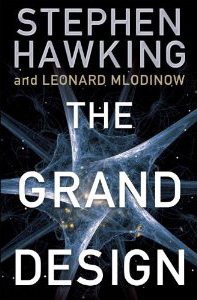
The Grand Design is a popular-science book written by physicists Stephen Hawking and Leonard Mlodinow and published by Bantam Books in 2010. The book examines the history of scientific knowledge about the universe and explains eleven-dimensional M-theory. The authors of the book point out that a Unified Field Theory may not exist.
Although biological evolution has been vocally opposed by some religious groups, many other groups accept the scientific position, sometimes with additions to allow for theological considerations. The positions of such groups are described by terms including "theistic evolution", "theistic evolutionism" or "evolutionary creation". Of all the religious groups included on the chart, Buddhists are the most accepting of evolution. Theistic evolutionists believe that there is a God, that God is the creator of the material universe and all life within, and that biological evolution is a natural process within that creation. Evolution, according to this view, is simply a tool that God employed to develop human life. According to the American Scientific Affiliation, a Christian organization of scientists:
A theory of theistic evolution (TE) — also called evolutionary creation — proposes that God's method of creation was to cleverly design a universe in which everything would naturally evolve. Usually the "evolution" in "theistic evolution" means Total Evolution — astronomical evolution and geological evolution plus chemical evolution and biological evolution — but it can refer only to biological evolution.

Brief Answers to the Big Questions is a popular science book written by physicist Stephen Hawking, and published by Hodder & Stoughton (hardcover) and Bantam Books (paperback) on 16 October 2018. The book examines some of the universe's greatest mysteries, and promotes the view that science is very important in helping to solve problems on planet Earth. The publisher describes the book as "a selection of [Hawking's] most profound, accessible, and timely reflections from his personal archive", and features, according to a book reviewer, "half a million or so words" from his essays, lectures and keynote speeches.

Quiz is a British drama television serial by James Graham, based on Graham's play of the same name commissioned by William Village and the book Bad Show: the Quiz, the Cough, the Millionaire Major by Bob Woffinden and James Plaskett. It is directed by Stephen Frears and consists of three hour-long episodes. The series focuses on Charles Ingram, a former army major in the Royal Engineers, and how he unexpectedly won the £1,000,000 jackpot on the quiz show Who Wants to Be a Millionaire? in 2001, followed by a criminal trial in which he and his wife were convicted of cheating their way to success.












